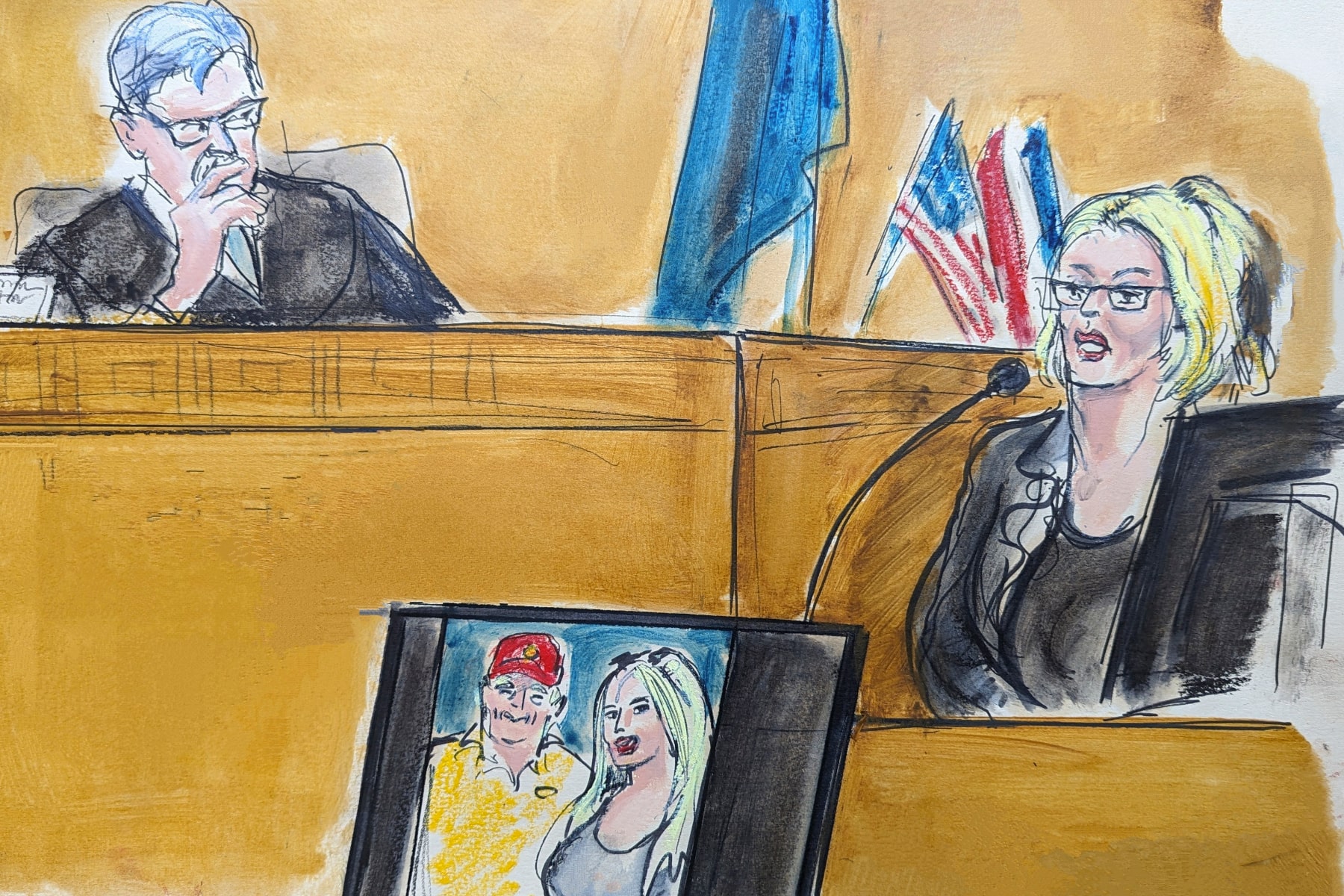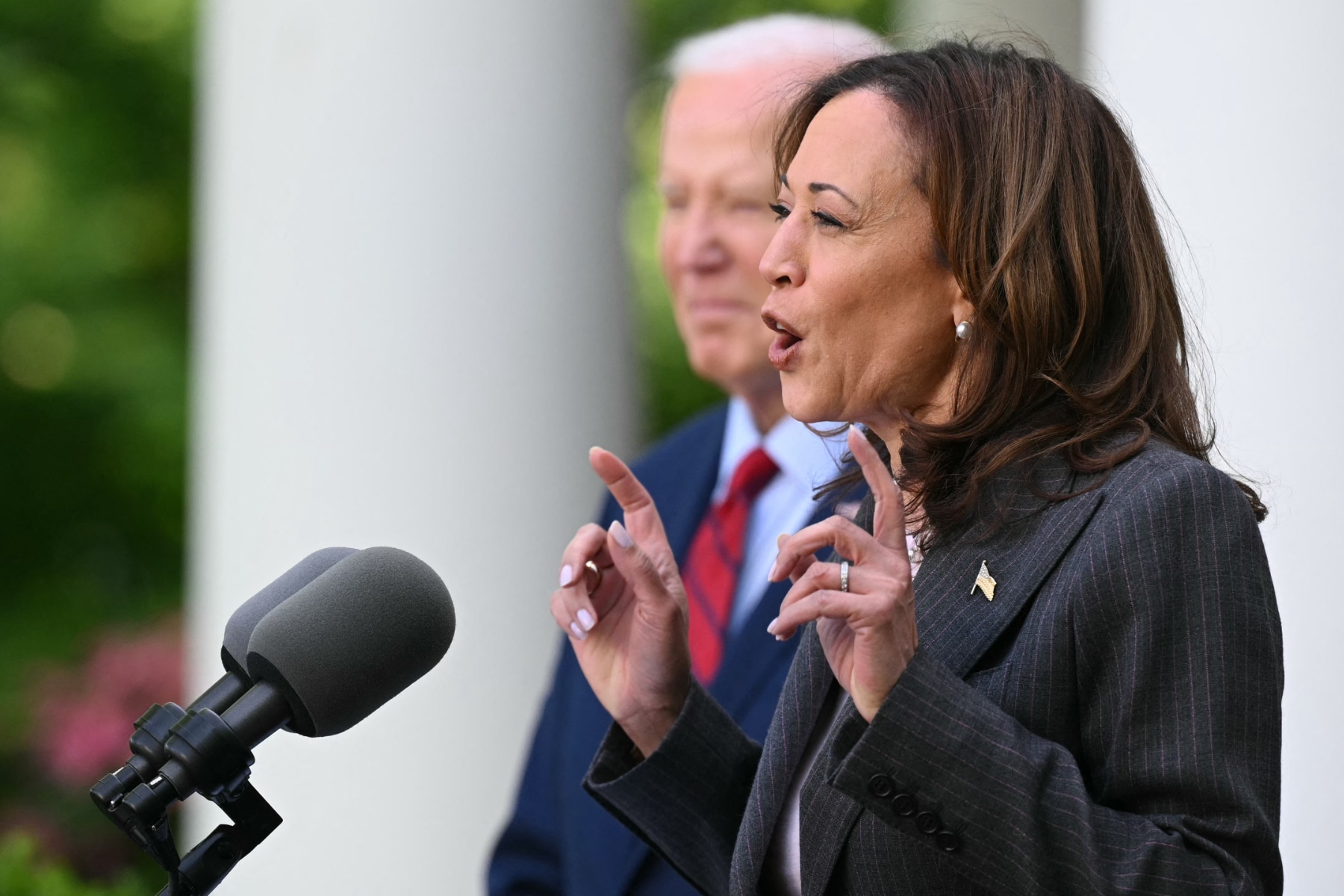This column first appeared in The Amendment, a biweekly newsletter by Errin Haines, The 19th’s editor-at-large. Subscribe today to get early access to future analysis.
Another vice president of the United States was caught publicly dropping an f-bomb.
This time, it was Kamala Harris, whose use of profanity was in service of a point she was making about representation in politics to a group committed to getting more Asian Americans involved in public service. “We have to know that sometimes people will open the door for you and leave it open; sometimes they won’t. And then you need to kick that fucking door down!” she said Monday to laughs, cheers and applause.
Her word echoed a comment from her current boss, then-vice president Joe Biden, who whispered to President Barack Obama in 2010, “This is a big fucking deal!” at the signing ceremony for the Affordable Care Act. It was a rare moment, a break from the decorum and dignity of the office.
Also on Monday, Michael Cohen, the former fixer and lawyer for ex-president Donald Trump, was on the witness stand in a New York City courtroom in his old boss’s criminal trial. Cohen told jurors how Trump, while campaigning for president in 2016, was worried about the impact of a story about him having an affair with adult film actor Stormy Daniels years earlier, even as he denied it happened. Trump’s fear, Cohen said, was that the story could derail his campaign in the final weeks of the election — particularly with women voters.
Cohen’s words on the stand bolstered those of Daniels, who last week testified that she was paid $130,000 to stay silent about the alleged one-night stand. Despite the defense’s attempts to slut shame Daniels and paint her as a gold digger, Daniels owned her story, maintaining that she has consistently told the truth about the events of that night.
We have seen a vice president and a porn star, both boldly taking up space and speaking in public as a means of wielding power. Millions of women, Republican, independent, Democrat, who will send their own loud message this November at the ballot box.
What do they all have in common at this moment? They are women speaking, with a clarity, authority and conviction that our society has told us they should not have.
Our country has never been comfortable with women using their voices.
Not when Sojourner Truth declared that she was a woman when Black people were considered property and subhuman. Not when women fought for the right to vote more than a century ago.
Not when journalist Ida B. Wells told the truth under threat of death and expulsion from the state of Tennessee about the racist lynchings of Black men by White mobs across the South. Not when Fannie Lou Hamer testified at the 1964 Democratic National Convention about voter suppression in Jim Crow Mississippi, her remarks interrupted by President Lyndon Johnson with a manufactured news conference that hijacked the televised hearing.
Not when Anita Hill testified in the United States Senate against Supreme Court nominee Clarence Thomas, alleging that he sexually harassed Hill when he was her boss. Not a generation later when Christine Blasey Ford testified before the same committee against Brett Kavanaugh’s nomination, claiming that he sexually assaulted her when they were teenage classmates.
The assumption that speaking with authority on serious topics and in the public square is largely the purview of men has been the cornerstone not just of our politics, but of the patriarchy. It’s a topic I think about often and that led me to recently read the 2017 book by British classics scholar Mary Beard, “Women and Power: A Manifesto.” In it, Beard argues that our cultural norms are actually rooted in ancient Western civilization. The price for women who break the rules has always been high, and today, we see that there are still consequences.
Exasperated after being constantly interrupted by former Vice President Mike Pence during their sole 2020 debate, Harris repeatedly interjected: “Mr. Vice President, I’m speaking.”
In the four years since, Harris has struggled to be heard in her historic role, despite meeting with 150 world leaders in nearly two dozen countries. She most often speaks to amplify the administration’s message, her words backing up those of the man leading the free world. While Biden speaks for the country, Harris has more often found her voice speaking on issues of gender or race, like abortion or voting rights. This, too, is part of gendered speech, Beard explains: “Women … may in extreme circumstances publicly defend their own sectional interests, but not speak for men or the community as a whole.”

We made it our business
…to represent women and LGBTQ+ people during this critical election year. Make it yours. Support to our nonprofit newsroom during our Spring Member Drive, and your gift will help fund the next six months of our politics and policy reporting. Can we count on you?
Swearing is still gendered, too, and profanity often referred to as “unladylike.” A 2019 study reported that women swear less than men, and in conversations where the gender was unknown, the person cursing was assumed to be a man. Harris has said that her favorite curse word “starts with an M and ends with an ‘ah’” – which is why Monday’s on-stage expletive likely came as no surprise to those who know (or have interviewed her), though social media certainly seemed to be shocked.
Profanity can also be used to punctuate a point. After years of her leadership being underestimated and overlooked, was Harris finally fed up and frustrated this week? No matter the motivation, she had an uncharacteristic moment of humanity, honesty and authenticity — a trait some voters have claimed Harris has lacked in public, and that critics argue has made it hard for her to connect with the American people.
Harris, who is Black and Asian American, made headlines Monday not just for her message, but for how she chose to emphasize it. Unlike Biden’s use of the same word, Harris didn’t whisper, and her message was meant for more than an audience of one, an audience whose voices have historically been excluded.
Stormy Daniels first told her story publicly in an interview in 2018, two years after the hush money payment allegedly ordered by Trump to buy her silence ahead of the 2020 election. Ahead of last week’s testimony, Daniels had been eager to tell it again, on the witness stand, seated just a few feet from the former president, who has pleaded not guilty to charges that falsifying records to hide the payment was part of an election interference scheme.
Daniels got her two days in court, testifying for seven hours. Her story was salacious and also sinister. She described an alleged encounter that was consensual, yet conflicted, reflecting a power dynamic between a 27-year-old woman navigating bedroom politics with a man she estimated to be her father’s age. In attempting to discredit Daniels, the defense attorney tried to cast her as rehearsed and opportunistic and Trump’s son, Eric, took to social media to disparage her during the trial.

During her cross examination, Daniels was asked repeatedly if she was making up her story, to which she repeatedly responded, “No.” After Daniels left the stand, Trump’s lawyers pushed unsuccessfully for a mistrial, claiming that her testimony was “highly prejudicial.”
Daniels also testified that she was concerned about her and her family’s safety, ultimately leading her to the decision to keep quiet ahead of Election Day. Would news of the alleged affair have made a difference with voters then? It’s impossible to know in hindsight. But prosecutors and a parade of witnesses have argued that Trump and his campaign feared this exact scenario. Headed into this election, it’s unclear whether character will be on the ballot, but what women think about the men running for president will again factor into how they vote.
As the #MeToo movement grew in 2017, the rallying cry became “Believe women.” Headed into the 2020 election, the message was, “Listen to Black women.” But the reality is, there has been a backlash against women who speak out in ways that seek to disrupt the status quo. And this includes the women who make up the majority of our electorate, who have used their vote as their voice to reject attempts to make them less free, fair and equal members of our democracy. True representation in our politics requires room for respect for every voice, which is why, despite the cost, there will always be those willing to kick the door down.
The question for everyone else going forward: Will we be the ones blocking that door, or holding it open?






